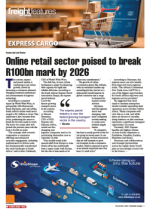ShipShape Software has introduced specialised system modules for the express parcel industry, designed to streamline workf lows and enhance visibility across high shipment volumes. According to JL Koekemoer, the company’s general manager and systems architect, users can pinpoint outstanding tasks and identify next steps for each parcel in real time, enabling more efficient and precise operations using these models.“E-commerce has truly turned this industry on its head. While the concept itself isn’t entirely new, what has been disruptive for many operators – along with key stakeholders such as customs authorities and government agencies – is the sheer scale at which volumes in this sector have surged over the past 12 months, and continue to grow at an unrelenting pace,” he told Freight News.With this in mind, it has become crucial for companies like ShipShape to provide solutions that help logistics providers navigate this fast-paced environment with enhanced control and agility. "As with many industries, technology is playing an increasingly pivotal role in supporting every aspect of the supply chain. From origin to final delivery, software platforms are now essential for automating processes, providing real-time visibility, monitoring exceptions, and ensuring compliance – on a scale that was unimaginable just a few ye a r s ago."According to Koekemoer, the sector is facing a range of challenges. "Compliance remains a significant obstacle," he said. "Many operators sought to enter the market over the past 12 to 18 months, but not all fully understood the complexities of remaining compliant, especially from a customs perspective, particularly when scaling operations. However, this understanding has gradually improved through ongoing private and public sector engagements, as well as collaboration with industry bodies like Saepa and Saaff."Another challenge is the image problem that e-commerce has faced over the past year. “The sector has attracted considerable criticism in the media, mostly related to compliance issues and concerns about its impact on local industries. While much has been discussed, recent policy changes by Sars should help address many of the emotive concerns that were raised just months ago,” said Koekemoer. "Efficiency, however, remains one of the biggest challenges. All stakeholders in the express supply chain must work to exponentially increase efficiency in order to meet acceptable delivery time frames while remaining compliant with statutory requirements like customs. This is where partnering with the right provider becomes essential. With the right solutions in place, ultra-high volume throughput can be achieved while maintaining proper visibility, auditability, and compliance at every step of the process."On the positive side, he noted that the significant increase in volumes was expected to drive job growth in areas such as warehousing and last-mile delivery for the foreseeable future.

